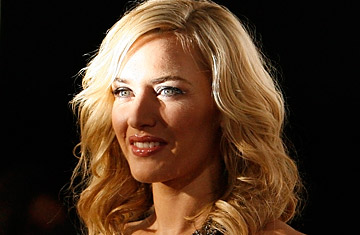
Kate Winslet
(3 of 5)
For the most part, though, Winslet's professional m.o. isn't hysteria. "Once I've dealt with something, got it all out--you know, vomited and wept and had the big discussion," she says, "I move on." She approaches her characters with curiosity and determination, with an anatomist's keenness to discover what makes them tick rather than a narcissist's desire to refashion them into glibly "relatable" versions of herself. She annotates every corner of her script, which resides in a satchel with a Dictaphone, a notebook, a camera, a pencil case, snapshots and any other tools she thinks she'll need. She's hungry, persistent, questioning. Winslet says the only fight she and her husband ever had about Revolutionary Road happened at their dinner table one evening after Mendes, an Oscar winner for American Beauty, had spent a long rehearsal day doing exploratory character work with all her co-stars.
"Sam is brilliant at saying to actors, 'Tell me about this character: Does she go to church? What does she think about at 11 in the morning?'" says Winslet. "I kept waiting for my turn." It never came. "He took it for granted that I was ready, and he said, 'I can't talk about it 24 hours a day.' And I just lost it. I said, 'I'm sorry, but you're gonna have to. You're my director, and if I wasn't playing April and the actress playing April phoned you, you'd leave your dinner to go cold and take that call for two hours in the other room! I know you would because I saw you do it with Jake Gyllenhaal!'" she says, recalling Jarhead and laughing as she re-creates her mini-tantrum.
Winslet won her point, but that's about as diva-ish as she gets. The kind of behavior that could get her called a movie star spooks her; she started running away from the label in 1998, desperate to escape Titanic mania, and if it's gaining on her, she doesn't want to know. "For her, it reflects a lifestyle she doesn't aspire to," says Mendes. "And also, if you call yourself a movie star, the next movie you're in will probably prove that you're not." Movie stars have projects built around them; Winslet seeks out movies in which she can serve a director or story by becoming an essential support beam in the film's overall architecture. Movie stars usually want more--more words, more screen time, more veto power; she wants less. When the playwright and screenwriter Doug Wright worked with her on Quills in 2000, he recalls, Winslet told him "with great tact, 'Doug, I'd never say a word against your writing, but this line? This one here? ... I don't have to say it. I can do it with my eyes.' It was the best lesson in screenwriting I've ever been given."
More than any of her peers, Winslet can shape her greatest moments within those silences. In The Reader, she bares her character in the piercing looks of lust, suspicion, self-loathing and judgment that Hanna directs at her young lover and in her terrible stares of incomprehension during her trial. And Revolutionary Road pivots on the scene in which April, sitting on the beach next to her husband, realizes that he is never going to keep his promise that they'll move to Paris--that he will always ultimately fail her. It's a shattering realization that Winslet conveys not only mutely but behind dark glasses.
